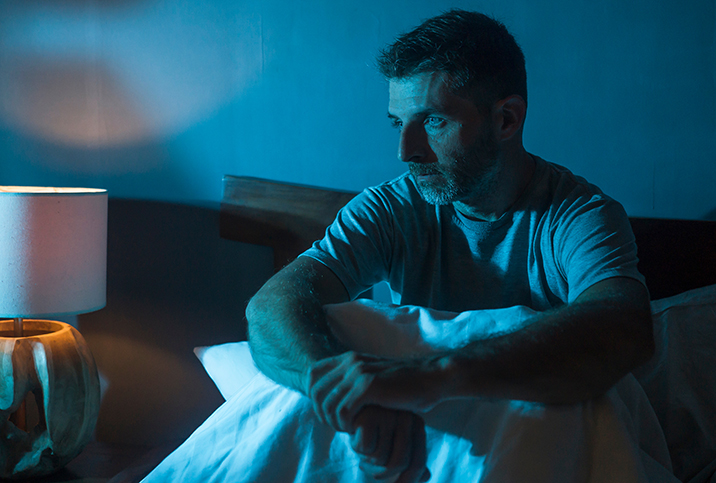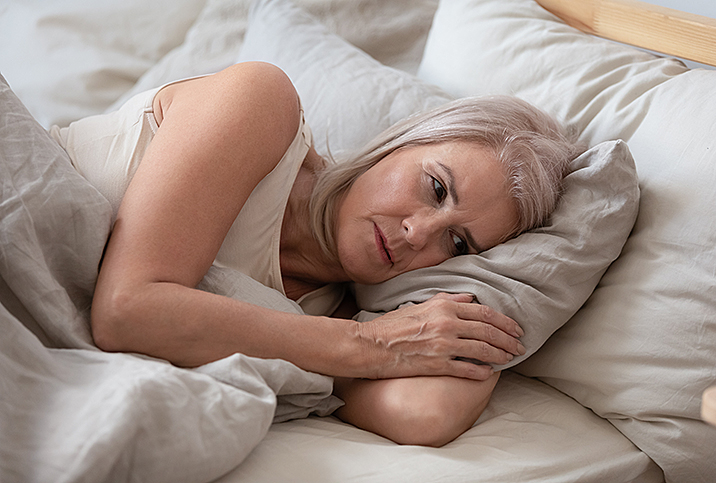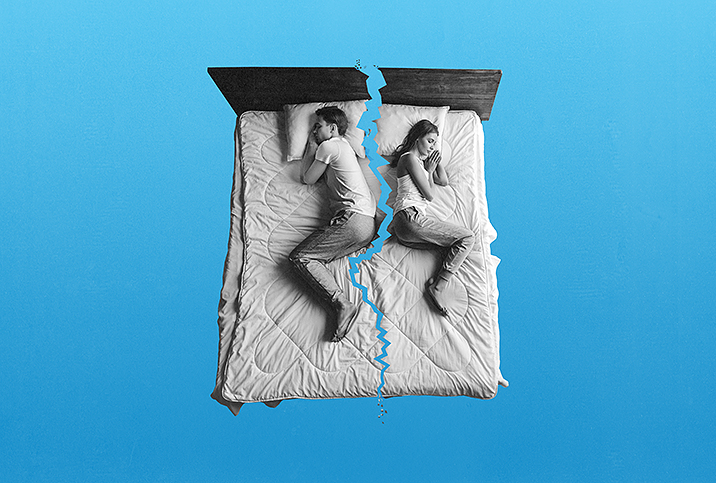The Link Between Sleep and Sexual Health

Sleep and sex both elicit an array of positive, pleasurable and satisfying emotions. It's no secret sleep is important, but the breadth of its impacts are not well understood. Similarly, sex provides more than immediate gratification and bonding with a partner. Both sleep and sex impact our physical and mental health, and each affects the other. Understanding their complex relationship can improve the quality of both.
How sleep affects the body
Sleep serves many functions for the body and affects health in a variety of ways. Its most basic role is to provide an opportunity for the body and brain to rest and recover. A sound night's sleep allows us to wake up refreshed and re-energized for the next day. Conversely, restless sleep may leave you feeling drained.
Sleep deprivation may exacerbate underlying mental health issues and can affect cognitive ability. Our mood is significantly impacted by sleep: sleep deprivation or low-quality sleep can result in emotional volatility, impaired decision-making and heighten daily stressors. Importantly, poor quantity and quality of sleep may exacerbate symptoms of known mental health issues including depression, anxiety, manic or bipolar disorder, and increase the risk of developing mental health issues and disorders.
Sleep is essential for forming memories, which are organized and consolidated during slow-wave, or stage 3 non-REM (rapid eye movement) sleep, and further solidified during REM sleep. Poor sleep can decrease the ability to form new memories and result in the inability to recall newly learned information. Cognitive functioning is dramatically impacted by sleep quality. Lack of sleep decreases concentration, creativity, and the ability to learn new skills and can result in decreased performance and problems at work or school.
Hormone levels fluctuate with sleep levels: Fewer hours of sleep may lead to an increase in hunger-inducing hormones, which can lead to overeating. Elevated cortisol, the stress hormone, may be higher late in the day in individuals short on sleep, placing them at risk for weight gain. Feeling fatigued decreases the likelihood you'll get your recommended dose of daily exercise, further contributing to obesity risk.
A consistent lack of sleep is associated with an increased risk for hypertension, which can lead to early heart disease and stroke. Studies show an association between lack of sleep and coronary artery calcification, indicating an increased likelihood of developing coronary heart disease. Diabetes risk increases as well since lack of sleep impacts the body's response to insulin, raising blood glucose levels.
Sleep is especially critical during childhood and adolescence when healthy growth and physical development are essential. Even the immune system is impacted—numbers of important immune cells (including T-cells and certain cytokines) peak during sleep, and inadequate rest can reduce the body's ability to fight viruses and infections. Getting less sleep can cause low-level chronic inflammation, increasing the risk of a wide array of diseases.
In addition to the physical ramifications, there are genuine safety concerns that arise when a person doesn't get enough sleep, such as a loss in reaction time and alertness. A 2013 driving study conducted by Virginia Tech Transportation Institute indicated fatigue is responsible for 20 percent of motor vehicle accidents. Similarly, workplace one are more common when an employee is sleep-deprived.
The impact of sleep on your sex life
Lack of sleep can result in decreased desire and arousal in women. A 2021 study published in the journal Menopause reported women with poor sleep quality were 1.48 times more likely to report female sexual dysfunction, a problem with desire, excitement, orgasm or resolution. Research indicates insomnia, which affects an estimated 25 percent of American women, is a risk factor for sexual health problems. Men are also impacted. Studies show sleep deprivation is associated with erectile dysfunction. Obstructive sleep apnea and working night shifts both increase the likelihood of sexual dysfunction in women and erectile dysfunction in men.
The mental health effects of poor sleep further impact sexual health. Depression and other mood disorders increase the risk for erectile dysfunction by 1.5 times, according to a 2011 study published in the International Journal of Impotence Research. Emotional dysregulation and mental health problems can also cause tension between partners. A struggling sex life can in turn cause stress and tension and negatively impact a relationship.
Interestingly, a poor night's sleep has been linked to increased arousal in women the following day. However, women who slept poorly the night before are no more likely to have sex, possibly because, despite a potentially increased libido, they simply feel too fatigued.
How sex affects sleep
The relationship between sleep and sex is two-way: sex can play a role in supporting quality sleep. Hormones released during sex, including oxytocin and prolactin, cause a feel-good sensation that supports a calm mind, relaxed nervous system and drowsiness. The stress hormone cortisol decreases after sex, fighting off insomnia and helping you drift off. Studies show men and women both report sleeping better after either sex with a partner or masturbation. However, not all sex is created equal. Research indicates orgasming improves sleep significantly more than simply having sex or masturbating. According to a 2017 study from the North American Menopause Society (NAMS), 65 percent of participants reported orgasming before bed led to better sleep.
How to improve sleep
Improving the quality and duration of sleep can boost overall health and your sex life. Good sleep hygiene can set the stage for a sound night's sleep. Set a consistent sleep schedule, with a defined bedtime and wake-up time, and try to adhere to it within 30 minutes each night. Research shows doing so reinforces the circadian rhythm and helps you fall and stay asleep. Avoid blue light (from your cellphone, laptop, TV) for at least 30 minutes to an hour before bed; studies show blue light can contribute to difficulty in drifting off because it interferes with a hormone called melatonin, which makes you feel sleepy. Consider investing in blue-light-blocking glasses, which are relatively inexpensive now.
Create a relaxing sleep environment, with a comfortable mattress, sheets and temperature (ideally between 60-67 degrees Fahrenheit). Experiment with a noise machine, gentle fan, face mask and earplugs to maximize sleep quality. Reserve daytime naps for emergencies: if you slept poorly the night before, nap in the morning or early afternoon and never more than 20 minutes. Longer naps or sleep later in the day can interfere with your ability to fall asleep at bedtime.
Get plenty of physical activity and consume a healthy, balanced diet. Both can increase the ability to fall and stay asleep. Avoid caffeine six hours before bed and alcohol, tobacco and large meals late in the evening, as each can interfere with sleep. Create a bedtime routine that includes something peaceful to calm your mind—meditation, yoga, reading. Make sleep a priority.
Sleep requirements vary by age and other factors. While individual requirements range, in general, newborns and infants need 15-17 hours a night; adolescents 8-10; adults 7-9; seniors 7-8. Talk to your doctor about your sleep needs and seek a professional evaluation if you have any signs of a sleep disorder (daytime fatigue, needing to take naps, abnormal breathing during sleep), which may require additional adjustments or treatment to ensure adequate quality rest. Treating an underlying sleep condition is critical to improving rest and its impact on sex life.
Support a healthy sex life by making simple changes. Opt for romantic lighting in the bedroom (warm lights, dimmers). Keep the space clean and comfortable. Use a diffuser or candles to ensure a pleasant scent. Consider optimal time for sex, depending on schedules and energy levels. Sex in the morning when you and a partner are refreshed may be better than late at night when you're tired from a long day. Or you may find making time for sex before bed helps you both drift off peacefully. Most important is communication with your partner(s). Be open about problems or concerns and work together to find a routine that lets you both get the most from sleep and sex.
Life is unpredictable, and you may not be able to stick to your sleep schedule every single day, but putting in the effort to do so most days can significantly improve your rest, well-being and sexual health.


















